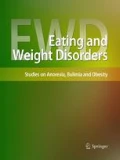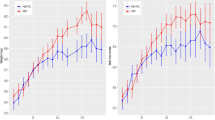Abstract
Treatment dropout is a significant challenge in the treatment of eating disorders. In day hospital/partial hospitalization program settings, little is known about factors associated with treatment dropout. The purpose of the present study was to assess factors associated with treatment dropout in a partial hospitalization program for adolescents and young adults with anorexia nervosa. Patients and parents completed self-report and interview-based measures at baseline and at end of treatment in the partial hospitalization program. Few factors were found that differentiated the two groups. Those who dropped out had lower body weight at end of treatment, were less likely to have purged in the previous month, and had fathers who scored higher on the criticism subscale of expressed emotion. Patients who are purging may be seen as having more severe symptoms, thus possibly reducing the chances of parents prematurely discontinuing treatment. Parental criticism is a potentially modifiable factor in treatment. Further research is needed to identify effective ways to reduce parental criticism, and to identify additional modifiable factors associated with treatment dropout to reduce dropout rates in this population.
Level IV: Evidence obtained from multiple time series with or without the intervention, such as case studies.
Similar content being viewed by others
References
Halmi KA, Agras WS, Crow S, Mitchell J, Wilson GT, Bryson SW, Kraemer HC (2005) Predictors of treatment acceptance and completion in anorexia nervosa: implications for future study designs. Arch Gen Psychiatr 62:776–781. https://doi.org/10.1001/archpsyc.62.7.776
Hoste RR, Zaitsoff S, Hewell K, Le Grange D (2007) What can dropouts teach us about retention in eating disorder treatment studies? Int J Eat Disord 40:668–671. https://doi.org/10.1002/eat.20421
Lock J, Couturier J, Bryson S, Agras S (2006) Predictors of dropout and remission in family therapy for adolescent anorexia nervosa in a randomized clinical trial. Int J Eat Disord 39:639–647. https://doi.org/10.1002/eat.20328
Lock J, Le Grange D, Agras WS, Moye A, Bryson SW, Jo B (2010) Randomized clinical trial comparing family-based treatment with adolescent-focused individual therapy for adolescents with anorexia nervosa. Arch Gen Psychiatr 67:1025–1032. https://doi.org/10.1001/archgenpsychiatry.2010.128
ter Hurrne ED, Postel MG, de Haan HA, van der Palen J, DeJong CAJ (2017) Treatment dropout in web-based cognitive behavioral therapy for patients with eating disorders. Psychiatr Res 247:182–193. https://doi.org/10.1016/j.psychres.2016.11.034
Agüera Z, Sánchez I, Granero R, Riesco N, Steward T, Martín-Romera V, Jiménez-Murcia S, Romero X, Caroleo M, Segura-García C, Menchon JM, Fernández-Aranda F (2017) Short-term treatment outcomes and dropout risk in men and women with eating disorders. Eur Eat Disord Rev 25:293–301. https://doi.org/10.1002/erv.2519
Watson HJ, Levine MD, Zerwas SC, Hamer RM, Crosby RD, Sprecher CS, O’Brien A, Zimmer B, Hofmeier S, Kordy H, Moessner M, Peat CM, Runfola CD, Marcus MD, Bulik CM (2017) Predictors of dropout in face-to-face and internet-based cognitive-behavioral therapy for bulimia nervosa in a randomized controlled trial. Int J Eat Disord 50:569–577. https://doi.org/10.1002/eat.22644
del Barrio AG, Gonzalez MYV, Gómez JG, Marín JIL, Carral-Fernández L, Hernandez SO, Río-Hortega IM, Malfaz LM (2017) Characteristics of patients in an eating disorder sample who dropped out: 2-year follow-up. Eat Weight Disord Stud. https://doi.org/10.1007/s40519-017-0416-7
Roux H, Ali A, Lambert S, Radon L, Huas C, Curt F, Berthoz S, Godard N, The EVHAN Group (2016) Predictive factors of dropout from inpatient treatment for anorexia nervosa. BMC Psychiatry 16:339. https://doi.org/10.1186/s12888-016-1010-7
Hubert T, Pioggiosi P, Huas C, Wallier J, Maria A-S, Apfel A, Curt F, Falissard B, Godart N (2013) Drop-out from adolescent and young adult inpatient treatment for anorexia nervosa. Psychiatr Res 209:632–637. https://doi.org/10.1016/j.psychres.2013.03.034
Dancyger I, Fornari V, Schneider M, Fisher M, Frank S, Goodman B, Sison C, Wisotsky W (2003) Adolescents and eating disorders: an examination of a day treatment program. Eat Weight Disord Stud 8:242–248. https://doi.org/10.1007/BF03325021
Goldstein M, Peters L, Baillie A, McVeagh P, Minshall G, Fitzjames D (2011) The effectiveness of a day program for the treatment of adolescent anorexia nervosa. Int J Eat Disord 44:29–38. https://doi.org/10.1002/eat.20789
Grewal S, Jasper K, Steinegger C, Yu E, Boachie A (2014) Factors associated with successful completion in an adolescent-only day hospital program for eating disorders. Eat Disord 22:152–162. https://doi.org/10.1080/10640266.2013.860848
Herpertz-Dahlmann B, Schwarte R, Krei M, Egberts K, Warnke A, Wewetzer C, Pfeiffer E, Fleischhaker C, Scherag A, Holtkamp K, Hagenah U, Bühren K, Konrad K, Schmidt U, Schade-Brittinger C, Timmesfeld N, Dempfle A (2014) Day-patient treatment after short inpatient care versus continued inpatient treatment in adolescents with anorexia nervosa (ANDI): a multicentre, randomised, open-label, non-inferiority trial. Lancet 383:1222–1229. https://doi.org/10.1016/S0140-6736(13)62411-3
Ornstein RM, Lane-Loney SE, Hollenbeak CS (2012) Clinical outcomes of a novel, family-centered partial hospitalization program for young patients with eating disorders. Eat Weight Disord Stud 17:e170–e177. https://doi.org/10.1016/j.jadohealth.2010.11.107
Rienecke RD, Accurso EC, Lock J, Le Grange D (2016) Expressed emotion, family functioning, and treatment outcome for adolescents with anorexia nervosa. Eur Eat Disord Rev 24:43–51. https://doi.org/10.1002/erv.2389
Szmukler GI, Eisler I, Russell GF, Dare C (1985) Anorexia nervosa, parental ‘expressed emotion’ and dropping out of treatment. Brit J Psychiatr 147:265–271. https://doi.org/10.1192/bjp.147.3.265
Brown GW, Carstairs GM, Topping GC (1958) The post hospital adjustment of chronic mental patients. Lancet. ii:685–689. https://doi.org/10.1016/S0140-6736(58)92279-7
Lock J, Le Grange D (2013) Treatment manual for anorexia nervosa: a family-based approach, 2nd edn. Guilford Press, New York
Hoste RR (2015) Incorporating family-based therapy principles into a partial hospitalization programme for adolescents with anorexia nervosa: challenges and considerations. J Fam Ther 37:41–60. https://doi.org/10.1111/1467-6427.12055
Sheehan DV, Lecrubier Y, Sheehan KH, Amorim P, Janavs J, Weiller E, Hergueta T, Baker R, Dunbar GC (1998) The Mini-International Neuropsychiatric Interview (M.I.N.I.): the development and validation of a structured diagnostic psychiatric interview for DSM-IV and ICD-10. J Clin Psychiatr 59:22–33
Sheehan DV, Sheehan KH, Shytle RD, Janavs J, Bannon Y, Rogers JE, Milo KM, Stock SL, Wilkinson B (2010) Reliability and validity of the Mini International Neuropsychiatric Interview for Children and Adolescents (MINI-KID). J Clin Psychiatr 71:313–326. https://doi.org/10.4088/JCP.09m05305whi
Lecrubier Y, Sheehan DV, Weiller E, Amorim P, Bonora I, Sheehan KH, Janavs J, Dunbar GC (1997) The Mini International Neuropsychiatric Interview (MINI). A short diagnostic structured interview: reliability and validity according to the CIDI. Eur Psychiatr 12:224–231. https://doi.org/10.1016/S0924-9338(97)83296-8
Fairburn CG, Beglin SJ (1994) Assessment of eating disorders: interview or self-report questionnaire? Int J Eat Disord 16:363–370. https://doi.org/10.1002/1098-108X(199412)16:4<363::AID-EAT2260160405>3.0.CO;2-#
Wiedemann G, Rayki O, Feinstein E, Hahlweg K (2002) The Family Questionnaire: development and validation of a new self-report scale for assessing expressed emotion. Psychiatr Res 109:265–279. https://doi.org/10.1016/S0165-1781(02)00023-9
Le Grange D, Doyle PM, Swanson SA, Ludwig K, Glunz C, Kreipe R (2012) Calculation of expected body weight in adolescents with eating disorders. Pediatrics 129:e438–e446. https://doi.org/10.1542/peds.2011-1676
Pfammatter M, Junghan UM, Brenner HD (2006) Efficacy of psychological therapy in schizophrenia: conclusions from meta-analyses. Schizophrenia Bull 32:S64–S80. https://doi.org/10.1093/schbul/sbl030
Pharoah F, Mari J, Rathbone J, Wong W (2010) Family intervention for schizophrenia. Cochrane DB Syst Rev 12:https://doi.org/10.1002/14651858.CD000088.pub2
Wendel JS, Miklowitz DJ, Richards JA, George EL (2000) Expressed emotion and attributions in the relatives of bipolar patients: an analysis of problem-solving interactions. J Abnorm Psychol 109:792–796. https://doi.org/10.1037/0021-843X.109.4.792
Hoyle D, Slater J, Williams C, Schmidt U, Wade TD (2013) Evaluation of a web-based skills intervention for carers of people with anorexia nervosa: a randomized controlled trial. Int J Eat Disord 46:634–638. https://doi.org/10.1002/eat.22144
Sepulveda AR, Lopez C, Macdonald P, Treasure J (2008) Feasibility and acceptability of DVD and telephone coaching-based skills training for carers of people with an eating disorder. Int J Eat Disord 41:318–325. https://doi.org/10.1002/eat.20502
Pépin G, King R (2013) Collaborative Care Skills Training workshops: helping carers cope with eating disorders from the UK to Australia. Soc Psychiatry Psychiatr Epidemiol 48:805–812. https://doi.org/10.1007/s00127-012-0578-6
Uehara T, Kawashima Y, Goto M, Tasaki SI, Someya T (2001) Psychoeducation for the families of patients with eating disorders and changes in expressed emotion: a preliminary study. Compr Psychiatr 42:132–138. https://doi.org/10.1053/comp.2001.21215
Brown GW, Birley JLT, Wing JK (1972) Influence of family life on the course of schizophrenic disorders: a replication. Br J Psychiatr 121:241–258. https://doi.org/10.1192/bjp.121.3.241
Peris TS, Miklowitz DJ (2015) Parental expressed emotion and youth psychopathology: new directions for an old construct. Child Psychiatry Hum Dev 46:863–873. https://doi.org/10.1007/s10578-014-0526-7
Wearden AJ, Tarrier N, Barrowclough C, Zastowny TR, Rahill AA (2000) A review of expressed emotion research in health care. Clin Psychol Rev 20:633–666. https://doi.org/10.1016/S0272-7358(99)00008-2
Author information
Authors and Affiliations
Corresponding author
Ethics declarations
Conflict of interest
Dr. Rienecke receives consulting fees from the Training Institute for Child and Adolescent Eating Disorders, LLC.
Ethical standards
All procedures performed in studies involving human participants were in accordance with the ethical standards of the institutional and/or national research committee and with the 1964 Helsinki declaration and its later amendments or comparable ethical standards. Informed consent was obtained from all individual participants included in the study. This article does not contain any studies with animals performed by any of the authors. The study was approved by the Institutional Review Board of the University of Michigan.
Informed consent
All participants provided informed consent prior to their participation.
Rights and permissions
About this article
Cite this article
Rienecke, R.D. Treatment dropout in a family-based partial hospitalization program for eating disorders. Eat Weight Disord 24, 163–168 (2019). https://doi.org/10.1007/s40519-018-0543-9
Received:
Accepted:
Published:
Issue Date:
DOI: https://doi.org/10.1007/s40519-018-0543-9



